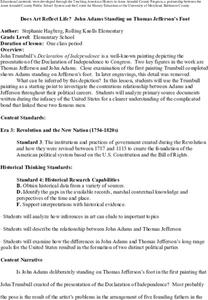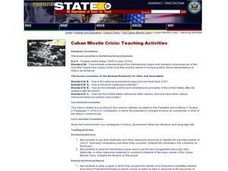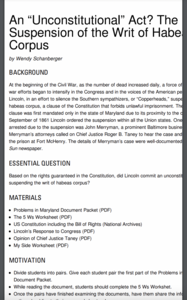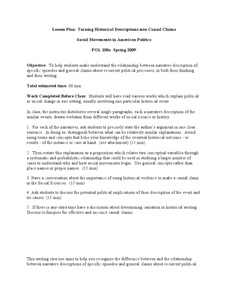Scholastic
The Right to Vote
Who used to have the right to vote in the United States? Who has the right to vote now? Amendments to the US Constitution that have changed the definition of eligible voters are the focus of a one-page activity that asks class members to...
Center for History Education
Why is John Adams Standing on Thomas Jefferson's Foot?
Was it a bromance, or were they frenemies? Young historians use a controversial portrait and letters between Thomas Jefferson, John Adams, and others to evaluate the relationship between the two Founding Fathers. Examining the primary...
Curated OER
Cuban Missile Crisis: Teaching Activities
Learners create a timeline of the important events of John F. Kennedy's presidency. They construct a timeline of the major events of the Cuban Missile Crisis. They compare the Missile Crisis events with their presentation in the movie...
Curated OER
Causes of the Civil War: Missouri Compromise, Compromise of 1850 and Kansas Nebraska Act
How did the Missouri Compromise, the Compromise of 1850, and the Kansas-Nebraska Act contribute to the growing tensions that led to the Civil war? To better understand the events that led to the Civil War, young historians engage in a...
Curated OER
Slavery and Empire 1440 - 1770
Young scholars reflect on the events that led up to slavery in the early years of North America. In this United States History lesson, students read excerpts from the book "Out of Many," then gather in small groups to answer specific...
Curated OER
An "Unconstitutional" Act? The Suspension of the Writ of Habeas Corpus
Young scholars explore the implications of habeas corpus. In this Civil War lesson, students analyze the writ of habeas corpus by Lincoln during the war. Young scholars examine primary sources from Lincoln and Chief Justice Taney....
Curated OER
Turning Historical Descriptions into Causal Claims
Eleventh graders study different political processes. In this American Government lesson, 11th graders read narratives about different political processes. Students write a sentence in their own words describing the concepts.
Curated OER
Who's Who in Government: Past, Present and Future
Twelfth graders research a list of governmental leaders of South Carolina's past and present. They briefly identify each by writing a short summary which includes the dates of their political career, party affiliation, positions held in...
Curated OER
1960 Election
Students examine the election of 1960. In this US politics lesson students listen to a teacher driven lecture, take notes, engage in a class discussion and write a response to what they have learned regarding the 1960's presidential...
Curated OER
American Migrations Timeline
In order to answer the question of whether the United States is a country of migrants or immigrants, students compile a list of migrations in America. From this list they conduct individual research for a particular episode of migration...
Curated OER
Campaign Songs as Propaganda
Student analyze campaign messages about tariffs in a nineteenth-century campaign song. They identify the intended audience of the message. They discuss strategies for courting the other political party's bloc.
Curated OER
Jackie Robinson, Civil Rights Advocate
Students examine the life of Jackie Robinson and the ways in which he and they can influence government policy.
Curated OER
Hamilton and Burr : Compare and Contrast
Who were Aaron Burr and Alexander Hamilton? High schoolers examine the character traits of these historical figures and watch the video, The Duel. Hamilton vs. Burr: An Event that Changed History (available from PBS), to gain an...
Gilder Lehrman Institute of American History
Women's Suffrage: 140 Years of Struggle
Young scholars create PowerPoint presentations about women's suffrage. In this women's rights instructional activity, students use primary documents to study the women's suffrage movement. In pairs, young scholars create a PowerPoint...
Curated OER
9/11: The Flight That Fought Back
Who is the al Qaeda and what happened on September 11? Older students will explore the political objectives of al Qaeda and possible reasons for the September 11 terrorist attacks by watching a video program and working through evidence...
Curated OER
Jeffersonianism at the Bar
Eleventh graders participate in a political roundtable discussion. In this Jeffersonianism lesson, 11th graders role play individuals from the 19th century and discuss issues of the Federalist period.
Curated OER
Global Warming
A series of independent learning activities teaches learners about global warming as it relates to economics and industrialization. The culminating project requires them to create a multimedia presentation identifying the problems,...
Agriculture in the Classroom
Growing a Nation: Into a New Millennium 1970-Present
If you want to focus on critical thinking skills, this well-constructed series of activities will challenge your history or agriculture class to evaluate the effectiveness of administrative decisions related to agricultural and the...
Curated OER
1960 America: Foreign Policy
The 1960's marked shifts in American culture, politics, and policy. Your class groups up to research a series of primary source documents resulting in a timeline and a 15 minute oral presentation. Active learning all the way.
Curated OER
Funding a Way to the Top
Review economic vocabulary, presidential election campaigns, and current campaign budgets (2004). Your class will determine how they feel about the amount of money spent on presidential campaigns, they will read an informational article,...
Curated OER
What Can We Learn about India from a Ten Rupee Bank Note?
The class finds and cites evidence showing India's unity in diversity and work to recognize some of the complex interactions of a civilized community. They read to understand how geography, history, politics, economics, beliefs, and...
Curated OER
Pioneer Values in Willa Cather's My Antonia
Included in this resource are a variety of activities to do while reading Willa Cather's My Antonia. The activities, which range from mapping out Nebraska to writing activities about pioneer living, are all designed with one guiding...
Curated OER
Book: Crossing the Seas
As learners read each chapter of Eric Schwartz's Crossing the Seas, they analyze the actions of United States in Venezuela, Hawaii, Cuba, the Philippines, Puerto Rico, and the intent of the Monroe Doctrine. They then compare American...
Curated OER
Andrew Jackson: 1767-1845
A thorough examination of Andrew Jackson's presidency and politics, these slides contain important facts and pictures of the growing United States. Events such as the Trail of Tears and the Tariff Battles of the early 19th century are on...

























